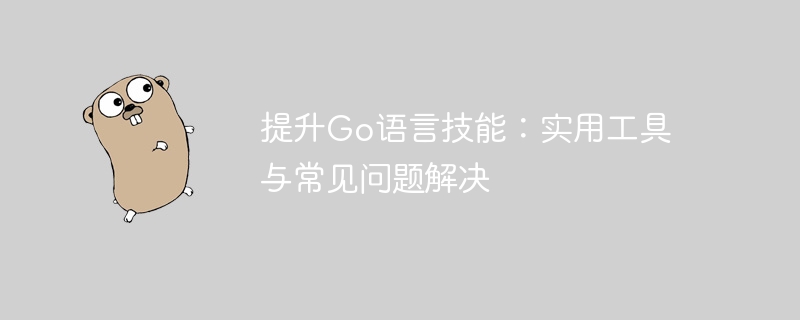Home >Backend Development >Golang >Improve Go language skills: practical tools and common problem solving
Improve Go language skills: practical tools and common problem solving
- WBOYWBOYWBOYWBOYWBOYWBOYWBOYWBOYWBOYWBOYWBOYWBOYWBOriginal
- 2024-03-05 10:18:041027browse

Improve Go language skills: practical tools and common problem solving
As an efficient and modern programming language, Go language is increasingly favored by developers. In the daily development process, mastering some practical tools and techniques for solving common problems can greatly improve development efficiency. This article will share some commonly used practical tools and methods to solve common problems in the Go language, hoping to help readers better improve their Go language skills.
1. Practical Tools
1.1 Go Modules
Go Modules is the dependency management tool officially recommended by the Go language, which can help developers effectively manage dependency packages in projects. Using Go Modules can avoid the problem of dependency package version conflicts and also make it easier to manage project dependencies.
When using Go Modules, you can initialize a new Go Modules project with the following command:
go mod init 项目名称
Then use the go mod tidy command to update dependencies, use go mod vendor command to copy dependent packages to the project's vendor directory.
1.2 Go Mock
When doing unit testing, you often encounter situations where you need to mock certain objects or functions. Go Mock is a tool for generating mock objects, which can help developers conduct unit testing more conveniently.
Install the Go Mock tool:
go get github.com/golang/mock/mockgen
Then use the following command to generate the object that needs to be simulated:
mockgen -source=源文件路径 -destination=目标文件路径
1.3 Go concurrency control
In the Go language, Concurrent programming can be easily implemented by using goroutine. However, sometimes we need to control the number of goroutines to avoid resource exhaustion or performance degradation.
You can use WaitGroup in the sync package of Go language to implement concurrency control. The sample code is as follows:
package main
import (
"fmt"
"sync"
)
func main() {
var wg sync.WaitGroup
for i := 0; i < 5; i++ {
wg.Add(1)
go func(i int) {
fmt.Println(i)
wg.Done()
}(i)
}
wg.Wait()
}2. Solving common problems
2.1 Memory leak
In the Go language, the memory will be automatically reclaimed by the garbage collector after it is used. However, sometimes memory leaks occur, causing the program to run less efficiently.
Common causes of memory leaks include not closing files, not releasing resources, etc. You can ensure timely release of resources by using the defer keyword.
package main
import (
"os"
)
func main() {
file, err := os.Open("file.txt")
if err != nil {
panic(err)
}
defer file.Close()
// 读取文件内容
}2.2 Concurrency Security
In concurrent programming, sometimes multiple goroutines operate shared resources at the same time, which is prone to race conditions leading to data inconsistency.
You can use Mutex in the Go language's sync package to implement a mutex lock to ensure that only one goroutine can access shared resources at the same time.
package main
import (
"sync"
)
var (
mu sync.Mutex
data map[string]string
)
func SetValue(key, value string) {
mu.Lock()
defer mu.Unlock()
data[key] = value
}
func GetValue(key string) string {
mu.Lock()
defer mu.Unlock()
return data[key]
}
func main() {
data = make(map[string]string)
}By mastering the above practical tools and methods to solve common problems, we can better improve Go language skills and improve programming efficiency and quality. I hope sharing this article will be helpful to everyone.
The above is the detailed content of Improve Go language skills: practical tools and common problem solving. For more information, please follow other related articles on the PHP Chinese website!

